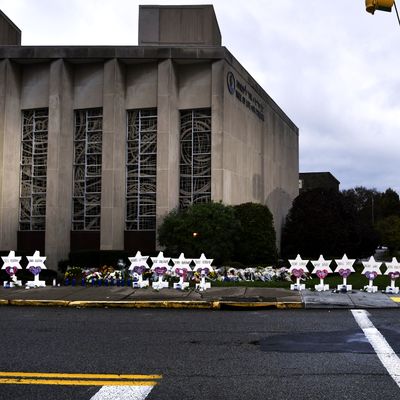
The Justice Department will seek the death penalty for Robert Bowers, the Pennsylvania man charged with murdering 11 worshippers at the Tree of Life synagogue in Pittsburgh last year. Bowers shouted, “All Jews must die,” during his rampage, which unfolded at morning services on October 27. His online activity revealed an obsession with white-nationalist conspiracy theories, including that Jews give safe haven to Central American migrants in order to wrest dominance from white people. “HIAS [the Hebrew Immigrant Aid Society]” — a Jewish-run humanitarian nonprofit — “likes to bring invaders in that kill our people,” Bowers wrote on the social-media platform Gab before opening fire. “I can’t sit by and watch my people get slaughtered. Screw your optics, I’m going in.”
The death penalty is the ultimate punishment available to the American legal system, and its pursuit suggests how seriously the state takes the offense for which it’s being considered. There’s recent precedent for its use following bigotry-motivated crimes like the Tree of Life massacre: Dylann Roof is on federal death row for killing nine worshippers at a black church in Charleston, South Carolina, in 2015. As with Roof, the prospect of Bowers’s execution has prompted resistance among his victims. The Dor Hadash congregation, which lost a member during the shooting, expressed disappointment, saying that seeking life imprisonment rather than death “would have prevented the attacker from getting the attention and publicity that will inevitably come with a trial and eliminated any possibility of further trauma that could result from a trial and protracted appeals.” These are two of several good reasons for opposing capital punishment on principle. But the Trump administration has occasioned another: the diminished symbolism of such violence under leaders who deploy violence so casually.
There’s little evidence that executing people convicted of crimes constitutes anything nobler or more effective than revenge. It has never been proven to deter criminal behavior. It ensnares innocent and wrongly convicted people at an alarming rate, as evidenced by how an average of three death row inmates a year were exonerated from 1973 to 1999, rising to five a year from 2000 to 2011. It’s racist — black prisoners are executed at a rate more than double their population share. It’s often carried out using “humane” drugs that cause excruciating pain in their subjects. And the United States is an outlier in deploying it; every European nation has abolished capital punishment save for Belarus, a dictatorship. What remains intact is its symbolism: The most effective part of the death penalty is the catharsis it grants those who support it. Not only does it reassert Americans’ collective control over those they fear, it clarifies their moral code by enforcing what qualifies as an executable offense or person. This has rarely been consistent in practice — people are often sentenced to death for crimes that earn others life in prison or less. But broadly speaking, the death penalty persists due to a widely agreed upon principle: that severe violence must be reserved as a weapon to use against people who commit severe violence.
Under this rubric, the Tree of Life massacre certainly qualifies. Eleven innocents lie dead in its wake. As with the Charleston shooting, the threat claimed by its perpetrator as justification belies the victims’ mostly elderly status; the youngest two were in their 50s, and the rest were 65 and above with three in their 80s and one 97-year-old. The ideology that drove their killer is, by broad consensus, grotesque: white nationalism, adherents of which have been complicit in a range of violent acts of late, including the mass shooting in El Paso, Texas, that claimed the lives of 22 people earlier this month. That both dynamics hint at societal problems President Trump has little interest in solving — from the mainstreaming of white supremacism to the wide availability of automatic firearms — affirms the death penalty’s timeworn status as a method for eradicating individual symptoms without solving the problems they embody.
Yet neither the heinous nature of Bowers’s crimes nor the suffering of his victims and their families can be done justice by an administration so gleeful and expansive in its use of violence. If the most severe retribution available to the state is reserved for its most severe transgressors, it becomes increasingly illegitimate when brutality is leveled against practically anyone the state deems worthy — often regardless of what they’ve done. Trump regularly encouraged assaults against political opponents at his rallies while running for president. He has implored police officers to rough up arrestees; when a supporter in Florida suggested shooting undocumented immigrants in May, Trump smirked and replied, “That’s only in the Panhandle can you get away with that statement,” after which the crowd cheered. While in office, he has overseen a migrant-detention system so brutal and inhumane it has killed seven children since last year. He insists on maintaining the forcible separation of parents from their children and the denial of basic amenities to both, like the ability to bathe and drink water that isn’t from a toilet, as a deterrent to other migrants fleeing gang violence and economic despair in their home countries.
This is violence run amok with little regard for the havoc it wreaks on people’s lives. The resultant suffering highlights the administration’s comfort with the pain inflicted against anyone it considers deserving. This includes children who’ve done nothing but seek opportunity in a country that did not birth them. An almost cartoonish inhumanity is required to argue that locking them in cages is the just and necessary response. But it also requires a cheapening of the punishment that so many insist is necessary in cases like that of Bowers. The death penalty has no moral weight where casual state violence is the norm. Rather than laying the groundwork for a convincing argument as to why Bowers should face execution, the Trump administration has provided, through its own brutality, yet another reason nobody should.






























